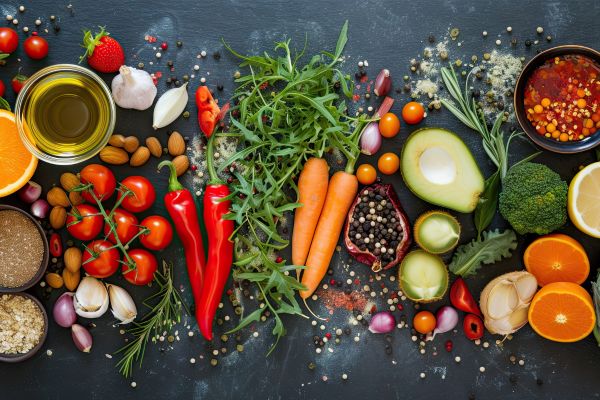Nutrition plays a pivotal role in addiction recovery, helping to heal the body and mind while reducing the risk of relapse. Choosing a balanced, mindful diet during recovery is essential to restoring energy, regulating mood and improving overall health. While healthy eating can enhance your recovery, certain foods may hinder progress or trigger cravings.
Foods to Avoid in Addiction Recovery
Choosing what not to eat is just as important as picking the right foods. Here are the key culprits to avoid.
Sugary Foods and Drinks
Sugar can mimic the effects of addictive substances by spiking dopamine levels, which are often depleted during addiction recovery. Overindulging in sugary foods can lead to a cycle of cravings and dependence, similar to substance addiction.
What to Avoid:
- Soda
- Candy
- Baked goods like cakes or cookies
- Sweetened cereals
- Flavored yogurts
Why to Avoid:
Replacing substance use with sugar addiction may hinder emotional healing and contribute to mood swings, weight gain and energy crashes.
Caffeine and Energy Drinks
Caffeine can amplify anxiety, disrupt sleep patterns and increase irritability, challenges often faced during early recovery. While moderate caffeine consumption might be safe for some, overuse can have adverse effects.
What to Avoid:
- Coffee
- Energy drinks
- High-caffeine sodas
Why to Avoid:
Caffeine’s stimulating effects can interfere with the body’s natural healing process, especially in individuals already prone to emotional dysregulation.
Processed and Junk Foods
Highly processed and junk foods lack the nutrients needed for recovery while high in fats, sodium, and artificial additives. They can leave you feeling lethargic and fail to support optimal brain function.
What to Avoid:
- Fast food
- Packaged snacks
- Frozen meals
Why to Avoid:
Poor nutrition from these foods may slow down the body’s ability to repair itself, leaving individuals susceptible to fatigue, irritability and poor concentration.
Foods That Trigger Cravings
Certain foods and ingredients can evoke memories or emotions tied to substance use, increasing the risk of relapse. Additionally, alcohol-infused foods may contain small traces of alcohol, which could act as a trigger.
Examples to Avoid:
- Fermented sauces
- Tiramisu
- Dishes cooked in alcohol
- Sweet or salty snacks associated with past substance-use environments
Why to Avoid:
These foods may reignite old habits, making it harder to focus on recovery.
What to Eat Instead: Healthier Alternatives
A recovery-friendly diet should focus on balance and nourishment. Here are some recommendations.
Whole, Nutrient-Dense Foods
To fuel your recovery, opt for fresh fruits, vegetables, whole grains, and lean proteins. These foods provide essential vitamins, minerals and antioxidants to repair damage caused by substance use.
Examples:
- Spinach
- Broccoli
- Quinoa
- Salmon
- Beans
Healthy Fats
Incorporate healthy fats, such as those in nuts, seeds, avocados and olive oil. These fats support brain health, crucial for emotional stability and cognitive recovery.
Examples:
- Almonds
- Chia seeds
- Flaxseeds
- Extra virgin olive oil
Hydration
Drinking enough water is critical during recovery, as it helps flush toxins from the body, improves digestion and supports mental clarity. Aim for 8–10 glasses daily or more if you’re physically active.
Bonus Tip: Herbal teas, such as chamomile or peppermint, can also help with hydration while offering calming benefits.
Probiotic-Rich Foods
Replenish your gut health with probiotics to aid digestion and support emotional well-being. A healthy gut is closely linked to better mood regulation and reduced stress.
Examples:
- Yogurt
- Kefir
- Kimchi
- Sauerkraut
- Miso
Complex Carbohydrates
Include slow-digesting carbs like sweet potatoes, oats, and whole-grain bread to stabilize blood sugar levels and sustain energy throughout the day.
Examples:
- Brown rice
- Barley
- Legumes
Lean Proteins
Protein-rich foods are vital for muscle repair and overall recovery. Choose lean sources to maintain a healthy weight and promote energy.
Examples:
- Chicken
- Turkey
- Tofu
- Eggs
- Pork loin
Foods Rich in Omega-3 Fatty Acids
Omega-3s can reduce inflammation, boost brain health and improve mood.
Examples:
- Salmon
- Walnuts
- Chia seeds
- Flaxseeds
The Role of a Balanced Diet in Long-Term Sobriety
A balanced diet goes beyond physical benefits—it directly impacts mental health and emotional stability. Consuming foods rich in vitamins and minerals can:
- Regulate mood: Avoiding sugar crashes and consuming complex carbs can help stabilize blood sugar levels.
- Reduce stress: Foods rich in omega-3s, such as salmon or walnuts, can lower inflammation and improve brain health.
- Boost energy: Whole foods provide sustained energy, reducing the fatigue that often accompanies early recovery.
When to Seek Help for Nutrition
Recovery is unique for everyone and dietary needs can vary. Here are clear indicators that it’s time to consult a nutritionist or dietitian specializing in recovery:
- Persistent Cravings or Relapses: If certain foods seem to trigger cravings or lead to setbacks, a nutritionist can help identify and replace these triggers with healthier options.
- Unexplained Physical Symptoms: Issues like chronic fatigue, digestive problems, or sudden weight changes might indicate nutritional deficiencies that require professional attention.
- Co-Occurring Conditions: If you’re managing other health concerns, such as diabetes, heart disease, depression, or anxiety, a tailored diet can support both recovery and overall health.
- Difficulty Planning Meals: If you’re unsure about what to eat or how to create balanced meals that meet your needs, a dietitian can provide guidance and easy-to-follow meal plans.
- Emotional Eating Patterns: Struggling with emotional eating or replacing substance use with unhealthy food habits is another sign to seek help.
A Better Diet: A Better Recovery
What you eat can significantly influence your addiction recovery journey. By avoiding foods that hinder healing, trigger cravings or disrupt emotional balance, you pave the way for sustained recovery and improved well-being. Adopting a mindful, balanced diet supports physical recovery and empowers you to build healthier habits for life.
